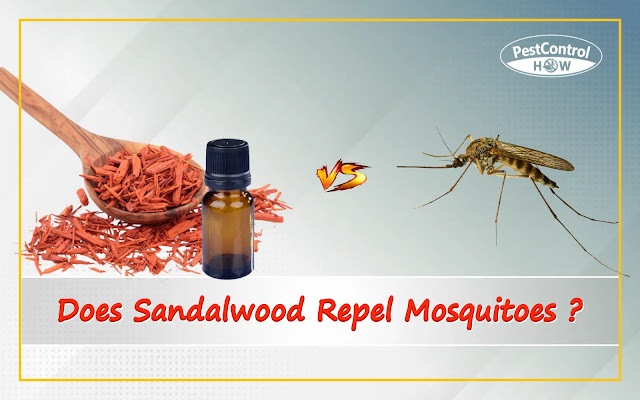Sandalwood oil is often used in perfumes, incense, and candles because of its beautiful fragrance. Sandalwood has been written about many times in different cultures and has even been revered by several civilizations throughout history. It gives off a warm incense-like scent that makes you feel comfortable or relaxed.
Sandalwood is a natural ingredient that provides many benefits for personal care, but what else is sandalwood used for? Does sandalwood repel mosquitoes? Read on to learn more about whether sandalwood oil is effective as an insect repellant.
{tocify} $title={Table of Contents}
Sandalwood is a sweet-smelling, golden-brown wood with a
strong odor native to India and Sri Lanka. It's used in incense and perfumes.
It is also popularly used in home decor because of its beautiful grain patterns
and deep coloration (and yes—it makes your house smell amazing). You can find
carved statues made with sandalwood at many museums worldwide. These are often
displayed prominently on display tables so that visitors can repeatedly see how
beautifully this precious material has been crafted into an art form!
Most of us think of sandalwood as a lovely smell — and of
course, it can be — but its other uses are more practical than you might
expect. Sandalwood oil, extracted from the tree's bark, has been used in traditional
medicine to treat skin problems such as eczema and psoriasis.
In fact, sandalwood oil is one of the most common
ingredients in Chinese Ayurvedic medicine for treating these conditions. It's
also an antiseptic and disinfectant because it has antibacterial properties
that help fight germs and keep wounds from getting worse or growing infected.
Why do people use
sandalwood oil to get rid of mosquitoes?
Sandalwood oil is an effective natural insect repellent.
It's a valuable ingredient in many commercial and personal care products,
including candles, soaps, and lotions. Sandalwood oil is often used as a
natural mosquito repellent because it's powerful enough to prevent insects from
coming near you or your property. This makes sandalwood oil an excellent choice
for areas where mosquitoes are known to frequent—like swamps or water sources
that might have stagnant pools of standing water (like lakes).
Sandalwood oil does not kill mosquitoes but makes them stay
away from you and your family. When applied to your skin or clothing, the
strong smell of sandalwood will keep mosquitoes from landing on you and biting
you. It also makes the insects move away from standing water, where they like
to breed in large numbers
Does sandalwood repel
mosquitoes?
Sandalwood oil has several properties that make it
effective as an insect repellent. First, sandalwood oil contains terpenes which
are smell molecules that insects find unpleasant. Sandalwood oil has a pungent
smell that is unpleasant to insects and other animals.
It's a bit tricky to find, but if you do find it, it can be
used in various ways to keep mosquitoes away. You'll probably want to ensure
that the sandalwood comes from Indonesia or India (the best sources) instead of
South Asia. Here most people use a type of sandalwood suitable for cooking
purposes.
Sandalwood oil is also a powerful antioxidant that helps
your skin fight off free radicals and other damage caused by UV rays and
pollution. This makes it a great product for people who spend lots of time
outdoors working or playing sports, or just living outside their homes.
How do you use
sandalwood oil as an insect repellent?
Sandalwood oil should be applied to exposed skin in small
amounts. It can be rubbed on the neck or chest with a cotton ball or swab, or you
can apply it with a spray bottle. Sandalwood oil has a scent that may not be
very pleasant if you use it too much, so only use it sparingly on exposed skin.
A few drops of sandalwood oil may not seem enough to
protect you from mosquitoes, but it will work if you're careful with how much
you apply and how often you reapply it throughout the day.
Are there any risks associated with using sandalwood oil
as a repellent?
Sandalwood oil may carry some side effects, including skin
irritation and allergic reactions. However, most side effects are mild and
temporary. The most common side effect of using sandalwood oil is skin
irritation at application sites where it comes in contact with clothing or skin
folds.
If you have severe allergic reactions to sandalwood (hives),
seek immediate medical care. When this occurs, wash the area thoroughly with
soap and water before applying more sandalwood oil. Other side effects include
itching or burning after applying the oil to skin areas such as the chest or
back; these symptoms usually lessen within about an hour but can persist for
several days.
Sandalwood essential
oil benefits
Sandalwood essential oil is a popular ingredient in
aromatherapy and skin care products. It's used to treat skin conditions like
acne, eczema, and psoriasis. Sandalwood oil can also be added to perfumes for
its pleasant scent and relaxing effect on the mind.
Sandalwood essential oil has been known for centuries as an
effective insect repellent—and recent research suggests that it may be even
more effective than previously thought!
According to one study published in the Journal of Economic
Entomology (JEE), sandalwoods can repel mosquitoes better than DEET-based
repellents such as Naled or Picaridin—but only when combined with other
ingredients like citronella or geranium oils.
Conclusion: Does
sandalwood repel mosquitoes?
Sandalwood essential oil is a popular ingredient in many
household products and perfumes. But did you know that it's also used as an
insect repellent? Sandalwood oil is made from the Indian sandalwood tree, which
has been used for centuries as a beauty treatment and therapeutic remedy
worldwide.
It contains compounds called sesquiterpenes (which can also
be found in other plants, such as rosemary). These compounds have been shown to
repel mosquitoes from humans and animals when applied topically or through a
sprayer!

